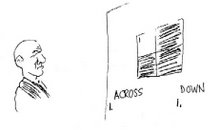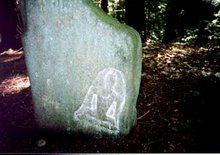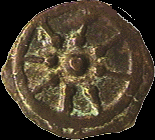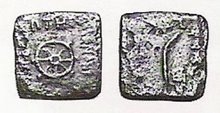The name Cepheus is derived from Aramaic Qēphā (“Cephas”), meaning “pebble” as in gravel. The Bible itself rules out the Roman claim that Keph=petros/stone AND petra/Peter, as if it even matters.
John 1:40 “Andrew, was Simon PETROS/KEPH brother. He was one of the two folks which heard John speak and followed him. 41 He first found his own brother Simon, and said to him, we done found the Messiah (interpreted Christ). 42 And he brought Simon to Jesus. And when Jesus saw him, he said, “Thou art Simon the son of Jona: thou shall be called CEPHAS/KEPH (which by errant interpretation becomes PETROS/KEPH).
Christ spoke in Aramaic; John wrote in Greek. So why did John switch from petros to Cephas in vs 42a only to explain it is a petros in 42b? Why was Keph translated as Petros 32 times elsewhere without comment but not in 42a? Why the sudden need to transliterate Keph as Cephas and not use the usual petros/Peter?
John didn't consider petros/Peter to be Keph/Cephas. This is certain if you read John explaining what sort of Keph/Cephas Christ was indicating - a petros (pebble), not a petra (rock)! In other words, as John consistently translated Cephas (keph) as Peter (petros) without comment everywhere else, why comment now?
The text is unnecessarily redundant if we accept as true the generalization of petros/stone and petros/Peter. To the contrary, this switch from petros to Cephas is necessary precisely because John does not consider petros/Peter is the Greek translation of Cephas/keph. John knows there is a different Aramaic word – pebble - underlying petros/Peter and it is not – rock - petra/keph.
IXEUS said: "You are only sand and gravel. It is upon (Petra) ROCK that I will build me church" In other words, Jesus (IXEUS, fishman) was slamming whoever Simon Peter really was (the scribes used only pseudonyms). Rock on....
After centuries of redaction, what Christ meant one cannot interpret any more than when translating dog into "Fido" and then, centuries later, "specifying a breed" from authority. Cephas cannot be interpreted, "petros/Peter." Petros/pebble, yes, Petra/Peter/Rock, no way. However Simon Peter means sand and gravel. That is abundantly clear!
John also knew nothing of the equation "Cephas/keph" = Petros/Peter" so necessary to Rome’s claim of Supremecy. The same is true of Matthew who in Mt 16:18 seems, as if he believed the generalization petros/Peter=Cephas/petra/keph, then switched from "petros" to "petra." Biblical redactors were active into the 8th century but obviously missed a few spots - or never read them.
Matthew, with redaction, supposedly translated Keph as Petros/Peter 22 times, so why the sudden switch to petra in 16:18b? Was it missed?
If Christ said in Aramaic "you are keph and upon this keph I will build," why didn't Matthew translate keph as petros both times: "You are petros and upon this petros I will build?" Matthew does NOT consider the Aramaic word underlying petros/Peter to be equivalent to petra/Keph. If he did he would be consistant.
Paul didn't consider petros to be equivalent to Cephas, in Gal 2:9. He switched to Cephas (rejecting petros).
If petros=Cephas then both came to be the man's names at the same time, in Jn 1:42.
Why does Cephas (pebble) identify Peter without question, but petros (rock) does not?
Why must Simon (Silas – sand) be used with petros (Cephas - pebble, gravel) to identify Peter, 33 times:
Matt. 4:18; 10:2; 16:16; Mk. 3:16; 14:37; Lk. 5:8; 6:14; Jn. 6:68; 13:6, 9, 24, 36; 18:10, 15, 25; 20:2, 6; 21:2f, 7, 11, 15, 17; Acts 1:13; 10:5, 18, 32; 11:13; 2 Pet. 1:1
Cephas has an incompatible property. It is not interchangeable with petros.
Petros/Peter and petros/petra/stone are translating different Aramaic words is mandated by the data. Certainly Petros/petra/stone and Petros/Peter are homonyms in Greek, spelled the same but meaning entirely different things.
German scholarship theorized there was in Aramaic a name common among Palestinian Jews of the time meaning "firstborn," PTR PeTeR. The context of Mt 16:18 supports that view as does also PRWTOS in Mt 10:2 where "first" is not a numbering of names on the list. Primacy.
The interpretation of Mt 16:18 as "You are firstborn and upon this very (Earth) Rock" makes sense to the context and the grammar whereas "You are Rock and upon HER Rock (Peter)" does not.
Recap: The name Cepheus is derived from Aramaic Qēphā (Cephas), meaning “pebble” as in gravel. Beyond this, he was Simon Peter – Silas Cephas – sand and gravel. This was the name of the apostle — son of Jonah, and mythical first bishop of Rome. Hence, to epitomize the silliness, Simon’s (Sand’s) Greek name is said to be Petros Peter, from the Greek feminine petra, meaning “rock.”
The Vatican bank is not Petra.
What of Rome, herself?
Romol means tiny (e.g. irritating) sand in Aramaic.
drumroll, rimshot, cymbal
beware: there are other thinkers out there....
Tuesday, February 16, 2010
Subscribe to:
Post Comments (Atom)








No comments:
Post a Comment